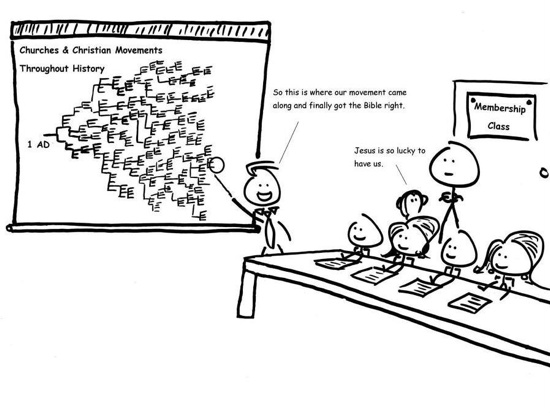Science commits suicide when it adopts a creed.
Thomas Henry Huxley
During my atheist phase I stumbled upon this cartoon (source unknown):

and yeah, it’s something to laugh about. How can they be so smug? How can they think they know they are right and all others were wrong?
But looking back at the last two and a half years during Covid, yeah, parts of science have a similar problem. For a lot of people — I would not call them scientists — the answer is clear. They know they are right, they represent science. Other people have to FOLLOW THE SCIENCE (TM) and the science is settled (because scientists have reached consensus).
Yeah, that’s the scientism version of that cartoon.
It makes you wonder what became of the stuff that is in many introductory textbooks: The history of the discipline. I always read it as information where the discipline came from, what it is build upon, including the corrected errors. And even more importantly, as a warning that what we know now is neither all there is to know, nor is it likely correct. We might laugh about phrenology (in psychology) or lobotomy (in medicine) today, but it is likely that people in the future will laugh about us today or look at us in horror regarding the things we think are correct or true.
But apparently, a lot of people think akin to the cartoon that the past was wrong and we now know «THE TRUTH». Perhaps not the details, but at least the general points. That attitude is rather dangerous for science. In the short time, it is very beneficial for scientists adhering to the dogma (e.g., political influence, research money, sense of moral superiority). In the long run, it leads to stagnation as new ideas that conflict with the dogma are killed outside the process of science. Instead of being discussed and judged based on evidence and argument, they are either not funded in the first place, ignored, or squashed outright as «fringe» ideas.
And honestly, we cannot afford that stagnation. We are currently in a dangerous time — the cultural level(s) we are on, the technology we have, the changes we have set in motion. We need scientific improvements more than ever.
So, we need less dogma, less «FOLLOW THE SCIENCE (TM)», less «the science is settled» — and more intellectual humility.
Let’s not be sure we know the answer, even if we think we have actually honestly examined the issue, collected evidence and developed the best arguments. No matter how sure we want, we need, we must feel — there is always the chance that we are wrong. And — while acting on the best arguments and evidence we have — we should remain open to the idea that we might be wrong.